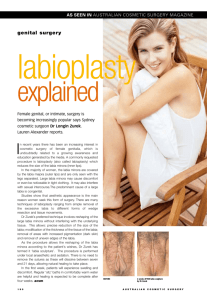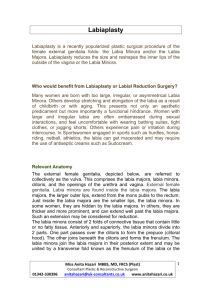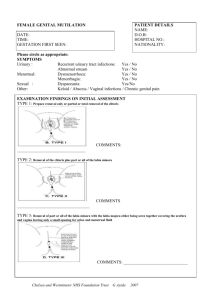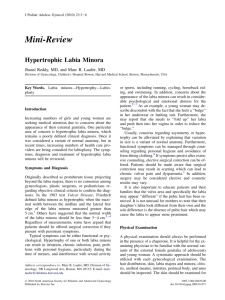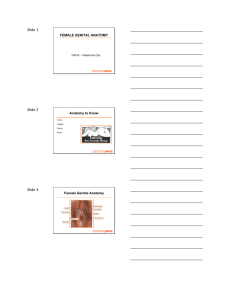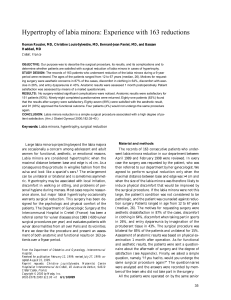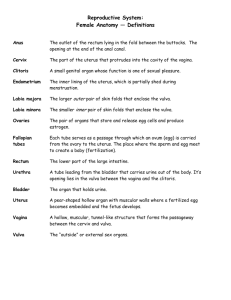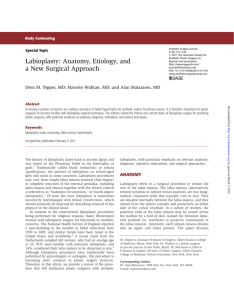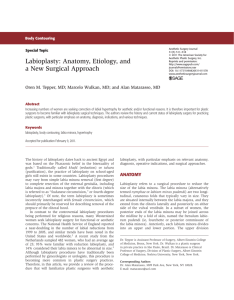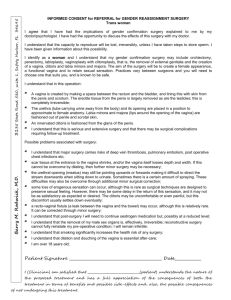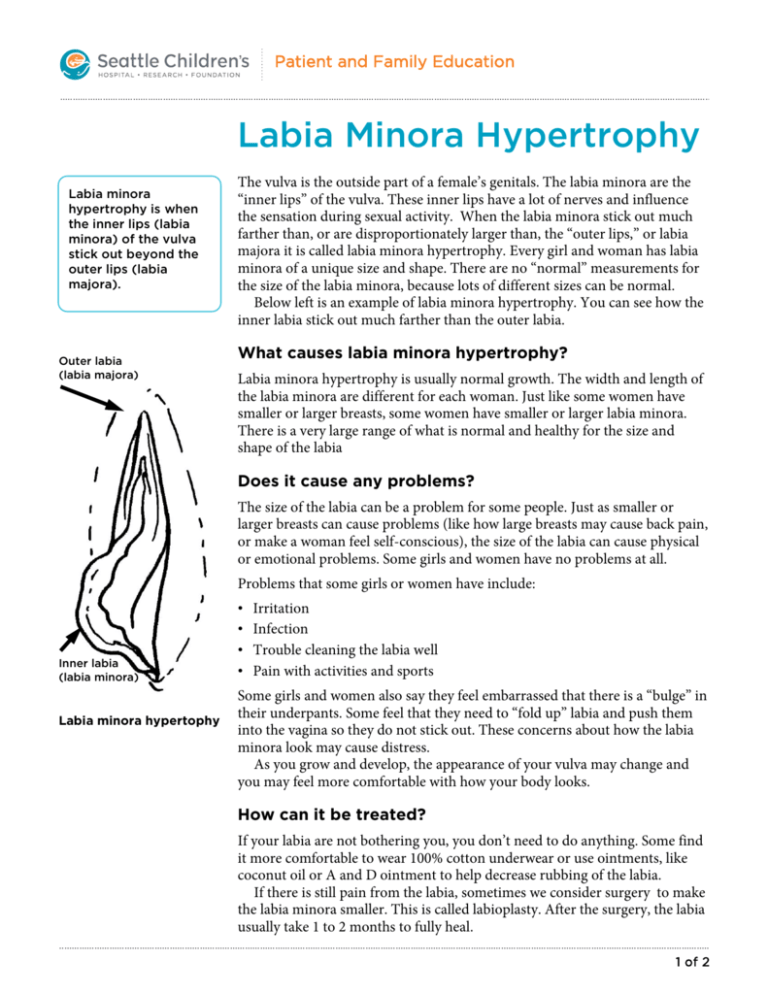
Patient and Family Education
Labia Minora Hypertrophy
Labia minora
hypertrophy is when
the inner lips (labia
minora) of the vulva
stick out beyond the
outer lips (labia
majora).
Outer labia
(labia majora)
The vulva is the outside part of a female’s genitals. The labia minora are the
“inner lips” of the vulva. These inner lips have a lot of nerves and influence
the sensation during sexual activity. When the labia minora stick out much
farther than, or are disproportionately larger than, the “outer lips,” or labia
majora it is called labia minora hypertrophy. Every girl and woman has labia
minora of a unique size and shape. There are no “normal” measurements for
the size of the labia minora, because lots of different sizes can be normal.
Below left is an example of labia minora hypertrophy. You can see how the
inner labia stick out much farther than the outer labia.
What causes labia minora hypertrophy?
Labia minora hypertrophy is usually normal growth. The width and length of
the labia minora are different for each woman. Just like some women have
smaller or larger breasts, some women have smaller or larger labia minora.
There is a very large range of what is normal and healthy for the size and
shape of the labia
Does it cause any problems?
The size of the labia can be a problem for some people. Just as smaller or
larger breasts can cause problems (like how large breasts may cause back pain,
or make a woman feel self-conscious), the size of the labia can cause physical
or emotional problems. Some girls and women have no problems at all.
Problems that some girls or women have include:
Inner labia
(labia minora)
Labia minora hypertophy
•
•
•
•
Irritation
Infection
Trouble cleaning the labia well
Pain with activities and sports
Some girls and women also say they feel embarrassed that there is a “bulge” in
their underpants. Some feel that they need to “fold up” labia and push them
into the vagina so they do not stick out. These concerns about how the labia
minora look may cause distress.
As you grow and develop, the appearance of your vulva may change and
you may feel more comfortable with how your body looks.
How can it be treated?
If your labia are not bothering you, you don’t need to do anything. Some find
it more comfortable to wear 100% cotton underwear or use ointments, like
coconut oil or A and D ointment to help decrease rubbing of the labia.
If there is still pain from the labia, sometimes we consider surgery to make
the labia minora smaller. This is called labioplasty. After the surgery, the labia
usually take 1 to 2 months to fully heal.
1 of 2
Labia Minora Hypertrophy
To Learn More
• Adolescent Medicine
206-987-2028
• Ask your child’s
healthcare provider
• www.seattlechildrens.org
Free Interpreter
Services
• In the hospital, ask
your child’s nurse.
• From outside the
hospital, call the
toll-free Family
Interpreting Line
1-866-583-1527. Tell
the interpreter the
name or extension you
need.
Risks
Any surgery has risks. This surgery includes risks of bleeding and infection. It
might cause scarring or chronic pain. Talk to your provider if you have other
questions about risks.
If I have surgery, what can I expect?
The way the labia minora look after surgery is different for each person. We
recommend waiting until you are through puberty for surgery, unless
someone is having a lot of symptoms.
Steps to follow after surgery:
• Relax and rest for 1 to 2 days after surgery. Avoid walking a lot, sitting for a
long time, or doing any activity you do not have to do.
• Wear cotton underpants. Avoid any underpants or pants that are tight or
uncomfortable.
• Avoid exercise for 2 weeks (no running, heavy lifting, straining, etc.).
Avoid activities that involve straddling, like bicycling or horseback riding,
for at least 4 weeks.
• Avoid any sexual activity for 4 weeks.
• It is OK to shower 1 day after the procedure. Pat the labia dry gently, do
not rub.
• Avoid taking baths or swimming for 2 weeks.
• Stitches will dissolve. They do not need to be taken out.
• You will have a follow up appointment 2 weeks after surgery to make sure
you are healing well.
Will insurance pay for surgery?
Insurance may cover this surgery when the labia minora measure longer than
5 centimeters and if you are having a lot of pain or skin irritation. You can call
your insurance company to ask about coverage.
Seattle Children’s offers interpreter services for Deaf, hard of hearing or non-English speaking patients, family members and
legal representatives free of charge. Seattle Children’s will make this information available in alternate formats upon request.
Call the Family Resource Center at 206-987-2201.
This handout has been reviewed by clinical staff at Seattle Children’s. However, your child’s needs are unique. Before you act
or rely upon this information, please talk with your child’s healthcare provider.
© 2011, 2015 Seattle Children’s, Seattle, Washington. All rights reserved.
Adolescent Medicine
7/15
PE1217
2 of 2

